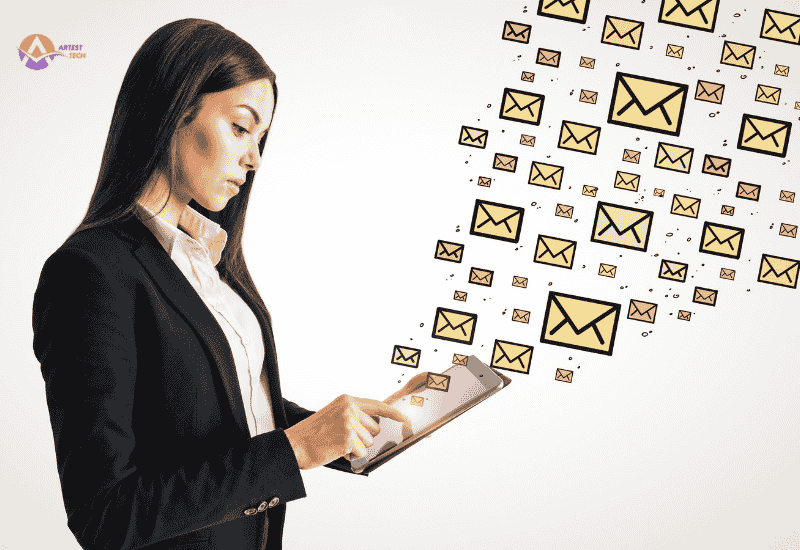
Email Marketing
Email marketing is the process of sending promotional or informational emails to a targeted audience to drive engagement. By building an email list, businesses can directly communicate with subscribers, offering personalized content, discounts, or updates. This targeted approach ensures that messages reach the right people, increasing the likelihood of conversions.
Additionally, email marketing provides measurable results, allowing businesses to track key metrics like open rates and click-through rates. Using this data, marketers can refine their strategies and improve campaign performance. As a result, email marketing is an essential tool for businesses looking to foster customer loyalty and boost sales effectively.
Why is Email Marketing Important for Businesses
Email marketing is crucial for businesses as it allows direct communication with customers, driving engagement and conversions. It is cost-effective and provides measurable results, enabling businesses to track performance and optimize campaigns. Moreover, personalized and segmented emails improve customer relationships and boost brand loyalty. Therefore, email marketing remains a vital tool for business growth.
Email Marketing Platform
An email marketing platform helps businesses create, send, and analyze email campaigns efficiently. These platforms offer automation, segmentation, and analytics features. By using tools like Mailchimp or Constant Contact, businesses can reach their audience effectively, improve engagement, and drive conversions. Consequently, email marketing platforms streamline communication and enhance marketing strategies.
Mailchimp
Mailchimp is a powerful email marketing platform that enables businesses to automate campaigns, segment audiences, and track performance. With user-friendly tools, businesses can design personalized email campaigns, improve engagement, and boost conversions. Additionally, Mailchimp offers robust analytics, allowing businesses to optimize strategies for better results. Therefore, it’s an essential tool for email marketing success.
Constant Contact
Constant Contact is a popular email marketing platform that simplifies campaign creation, email automation, and audience segmentation. It allows businesses to design professional emails, track performance, and improve engagement with targeted messages. Furthermore, its user-friendly interface and customizable templates make it accessible for businesses of all sizes. Therefore, Constant Contact enhances email marketing efficiency and effectiveness.
Email Marketing in Digital Marketing
Email marketing plays a pivotal role in digital marketing by enabling businesses to directly communicate with their audience. It helps nurture leads, build relationships, and drive conversions through targeted, personalized messages. Moreover, email marketing is highly cost-effective, offering a high return on investment (ROI) compared to other digital marketing strategies. Consequently, it remains an essential tool for any successful digital marketing campaign.
Benefits of Email Marketing
Email marketing offers numerous benefits, including high ROI, direct customer engagement, and the ability to track campaign performance. It helps businesses build relationships by sending personalized content, driving conversions, and increasing brand awareness. Furthermore, email marketing allows for cost-effective promotions and targeted campaigns, making it an essential tool for business growth.
High ROI and Cost-Effectiveness
Email marketing provides a high ROI by reaching a targeted audience at a low cost, ensuring maximum value. Consequently, businesses can achieve significant results with minimal investment, driving both engagement and conversions efficiently.
Increased Engagement and Conversion Rates
Email marketing drives increased engagement by delivering personalized content directly to subscribers, encouraging interaction and fostering loyalty. By segmenting audiences, businesses can send relevant offers and information that resonate with recipients, leading to higher open rates and click-through rates. Consequently, these targeted emails significantly improve conversion rates, resulting in more sales and customer retention.
Build and Nurture Relationships with Customers
Email marketing helps businesses build and nurture relationships by sending personalized messages that engage and inform customers. By offering valuable content, promotions, and updates, businesses can keep their audience engaged over time. Consequently, consistent communication strengthens customer loyalty and trust, leading to long-term relationships and repeat business.
Types of Email Campaigns
Newsletter Campaigns
Newsletter campaigns provide valuable content, updates, and news to keep subscribers engaged and informed about your brand.
Promotional Campaigns
Promotional emails are designed to drive sales and conversions, offering discounts, special offers, or new product launches.
Welcome Email Campaigns
Welcome emails introduce new subscribers to your brand, offering a warm greeting and useful information to start the relationship.
Transactional Email Campaigns
Transactional emails, such as order confirmations and shipping updates, provide important information related to customer actions.
Abandoned Cart Campaigns
These emails target customers who added items to their cart but didn’t complete the purchase, encouraging them to finish the transaction.
Re-engagement Campaigns
Re-engagement emails are sent to inactive subscribers, aiming to revive interest by offering special deals or reminding them of the value you offer.
Seasonal or Holiday Campaigns
Seasonal campaigns focus on special offers related to holidays or events, driving sales during peak shopping times.
Survey and Feedback Campaigns
Event invitation emails promote upcoming webinars, conferences, or product launches, encouraging subscribers to attend and participate.
Referral Campaigns
Referral emails incentivize existing customers to refer new subscribers or customers, often offering rewards for successful referrals.
Creating Effective Email Campaigns
Creating effective email campaigns requires a strategic approach to ensure your messages resonate with the right audience. Start by defining your goal—whether it’s driving sales, nurturing leads, or building brand awareness. Craft compelling subject lines that grab attention and encourage opens, as this is the first impression your recipients will have.
Next, focus on personalizing your content based on user preferences, behavior, or demographics. Personalization increases relevance, leading to higher engagement. Visually appealing email design is also crucial; ensure your emails are mobile-friendly and optimized for different devices. Include clear calls-to-action (CTAs) that direct subscribers towards the desired action, whether it’s making a purchase or signing up for a webinar.
Crafting Compelling Subject Lines
Crafting compelling subject lines increases open rates, as attention-grabbing words and urgency prompt recipients to engage with your email.
Designing Visually Appealing Emails
Designing visually appealing emails enhances user experience, increases engagement, and drives conversions by using attractive, mobile-friendly layouts and clear branding.
Writing Engaging and Relevant Content
Writing engaging and relevant content ensures higher open rates, as it resonates with subscribers and encourages them to take action.
Clear Calls-to-Action (CTAs)
Clear calls-to-action (CTAs) guide recipients to take desired actions, increasing conversions by making next steps easy and obvious.
Building and Growing Your Email List
Building and growing your email list is essential for successful email marketing. Use lead magnets, incentives, and opt-in forms to attract subscribers. By offering valuable content, businesses can encourage users to join the list, ensuring future engagement. Consequently, a strong email list leads to higher conversions and long-term customer relationships.
Effective List Building Strategies
Effective list building strategies include offering incentives, using opt-in forms, and providing valuable content to attract and retain subscribers.
Importance of Permission-Based Marketing
The importance of permission-based marketing lies in building trust, ensuring relevant content delivery, and reducing the risk of spam.
Tools for Growing Your Email List
Tools for growing your email list include lead magnets, opt-in forms, pop-ups, and landing pages to capture potential subscribers.
Email Marketing Automation
Email marketing automation enables businesses to send personalized, targeted emails to their audience without manual intervention. By automating workflows such as welcome emails, abandoned cart reminders, and post-purchase follow-ups, businesses can maintain consistent communication while saving time. As a result, automation enhances customer experience and encourages higher engagement, driving better results.
Additionally, email marketing automation provides valuable insights into customer behavior and campaign performance. With tools like A/B testing and advanced analytics, businesses can refine their strategies for optimal results. Consequently, automated campaigns lead to higher open rates, click-through rates (CTR), and conversions. Therefore, email marketing automation is essential for businesses looking to scale their marketing efforts and improve overall efficiency.
Personalization in Email Marketing
Personalization in email marketing enhances engagement by tailoring content to individual subscriber preferences, behaviors, and demographics. By using customer data, businesses can create relevant and timely messages that resonate with their audience. For example, personalized product recommendations or special birthday offers significantly increase open rates and click-through rates (CTR).
Analyzing and Measuring Email Campaign Performance
Analyzing and measuring email campaign performance is crucial for optimizing future campaigns. Key metrics like open rates, click-through rates (CTR), and conversion rates help businesses assess the effectiveness of their emails. By tracking these metrics, marketers can identify what resonates with their audience, refine their strategies, and improve engagement over time.
Common Email Marketing Mistakes to Avoid
One common mistake is ignoring the importance of subject lines. A weak or generic subject line can result in low open rates, even if the content inside is valuable. To avoid this, always craft compelling, personalized subject lines that spark curiosity or highlight the email’s value. This can significantly improve engagement.
Additionally, many marketers overlook the power of timing and frequency. Sending emails too frequently can annoy subscribers, while infrequent emails may lead to disengagement. It’s important to find the right balance, sending emails at optimal times based on your audience’s behavior. By doing so, you can maintain a healthy relationship with your subscribers and improve your campaign’s effectiveness.
The Future of Email Marketing
The future of email marketing is focused on personalization and automation, ensuring more targeted and relevant content for each subscriber. With advanced AI and machine learning, marketers can automate campaigns and personalize messages based on customer behavior, leading to better engagement. As a result, businesses will be able to nurture relationships more effectively.
Additionally, the integration of interactive content in emails will become a major trend. Features like embedded surveys, polls, and videos will increase engagement and allow subscribers to interact directly within their inbox. Consequently, interactive emails will drive higher conversion rates and enhance the overall user experience, making emails more dynamic and effective.
Finally, mobile optimization will continue to be crucial as more consumers access emails on smartphones. Businesses must ensure their emails are responsive, fast-loading, and visually appealing on all devices. Therefore, optimizing for mobile will play a key role in email marketing success, ensuring businesses stay connected with their audience.
Conclusion
In conclusion, email marketing remains a powerful tool for businesses to engage customers, drive conversions, and build relationships. By leveraging personalization, automation, and interactive content, businesses can enhance their campaigns and achieve higher engagement. Furthermore, focusing on mobile optimization and data-driven strategies will ensure long-term success, making email marketing an essential component of digital marketing strategies.
